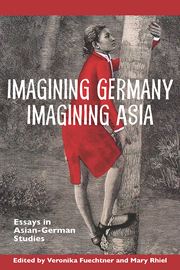Book contents
- Frontmatter
- Contents
- Acknowledgments
- Introduction
- Part I Contemporary Challenges to German Borders and Identities
- Part II Travel and Representation
- 5 Germany's India: A Critical Re-interrogation
- 6 Indians, Jews, and Sex: Magnus Hirschfeld and Indian Sexology
- 7 The Ambivalence of a Spiritual Quest in India: Waldemar Bonsels's Indienfahrt
- 8 Traveling through Imperialism: Representational Crisis and Resolution in Elisabeth von Heyking's and Alfons Paquet's Travel Writing on China
- 9 Measuring Asian-ness: Erwin Baelz's Anthropological Expeditions in Fin-de-Siècle Korea
- Part III Asia Inhabits Germany's Cultural and Intellectual History
- Bibliography
- Notes on the Contributors
- Index
7 - The Ambivalence of a Spiritual Quest in India: Waldemar Bonsels's Indienfahrt
from Part II - Travel and Representation
- Frontmatter
- Contents
- Acknowledgments
- Introduction
- Part I Contemporary Challenges to German Borders and Identities
- Part II Travel and Representation
- 5 Germany's India: A Critical Re-interrogation
- 6 Indians, Jews, and Sex: Magnus Hirschfeld and Indian Sexology
- 7 The Ambivalence of a Spiritual Quest in India: Waldemar Bonsels's Indienfahrt
- 8 Traveling through Imperialism: Representational Crisis and Resolution in Elisabeth von Heyking's and Alfons Paquet's Travel Writing on China
- 9 Measuring Asian-ness: Erwin Baelz's Anthropological Expeditions in Fin-de-Siècle Korea
- Part III Asia Inhabits Germany's Cultural and Intellectual History
- Bibliography
- Notes on the Contributors
- Index
Summary
During the final decades of the nineteenth century, the spiritual and cultural identity of many German intellectuals came under pressure as a new sociocultural paradigm—economic (proletarization and industrial capitalism), political (democratization), and scientific (empirical models of knowledge) replaced older traditions and values. To put it more boldly, the spiritual integrity of the human being seemed for many thinkers to have been relegated to the junk heap of a Darwinian world, in which living beings clashed over resources and struggled for survival. Such tensions resonate frequently in the era's debates over science and human knowledge. The Buddhist advocate Theodor Schultze (1824–98), for instance, rebukes the scientific method as overly attached to organic nature, in which, as he posits, “nicht mehr die ‘Lebenskraft’ wohl aber ‘das Leben,’ ‘der Organismus,’ ‘die Natur’ und dergleichen Subjekte mehr als unmittelbar wirkende Mächte oder Prinzipien auftreten, weil der Verfasser nicht im Stande ist, die Vorgänge des Lebensprozesses bloß aus den Kräften der unorganischen Natur zu erklären.” Paul Dahlke (1865–1928), a medical doctor and another Buddhist devotee, admonishes: “Je weiter der menschliche Geist vorwärts schreitet, um so breiter und entschiedener klafft der Spalt zwischen Glaube und Wissenschaft.” Yet these concerns cannot be relegated to the discordant voices of a few fringe intellectuals. A quick glance through the more mainstream Protestant and Catholic journals published during the Kaiserreich (1871–1918), for instance, also reveals the widespread aversion to “materialism's” predominance and a growing sense of spiritual vacuity among the era's intellectuals.
- Type
- Chapter
- Information
- Imagining Germany Imagining AsiaEssays in Asian-German Studies, pp. 131 - 154Publisher: Boydell & BrewerPrint publication year: 2013

